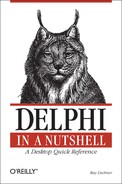Name
On Directive
Syntax
tryStatements... except onVariable:Class namedoStatement; onClass namedoStatement; elseStatements... end;
Description
The on directive introduces an exception handler
in a try-except statement. You
can have any number of exception handlers. Each one introduces an
exception class, possibly with a variable name.
Delphi tests the exception object against each exception class, in
order of appearance. The search stops with the first handler where
the exception object’s class matches the handler’s class
or is derived from the handler’s class (the
is operator returns True). Delphi then executes
the associated statement (or block), and if that statement does not
raise another exception, execution continues with the statement
following the end keyword for the
try-except statement.
If the handler includes a variable name, Delphi assigns the exception
object to that variable. The variable’s lexical scope is the
exception handler, so you cannot refer to the variable in a different
handler or outside the
try-except statement.
If no classes match the exception object, and an
else clause appears, Delphi executes the
statements following the else. If no classes
match, and the try-except has
no else clause, the same exception is raised,
giving another try-except
statement an opportunity to handle the exception.
At the end of the exception handler, Delphi frees the exception
object unless the handler raises the same exception with the plain
raise statement.
Tips and Tricks
An exception handler can raise an exception, in which case control immediately leaves the
try-exceptstatement, and Delphi searches for another exception handler, farther back in the call stack.Because Delphi searches the exception handlers in order, you should always put the most specific exception classes first.
Any object can be an exception object. By convention, Delphi uses classes that inherit from
SysUtils.Exception. Most exception classes are declared in theSysUtilsunit. Appendix B, lists the standard exception classes.
